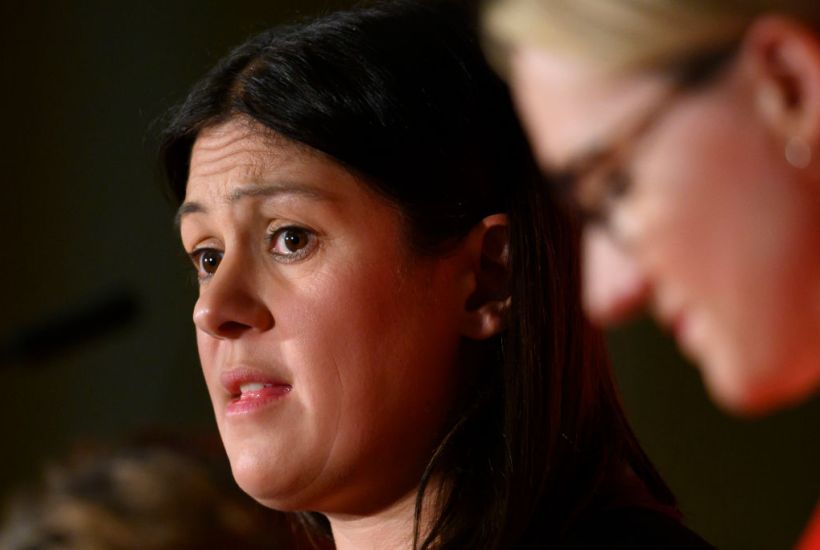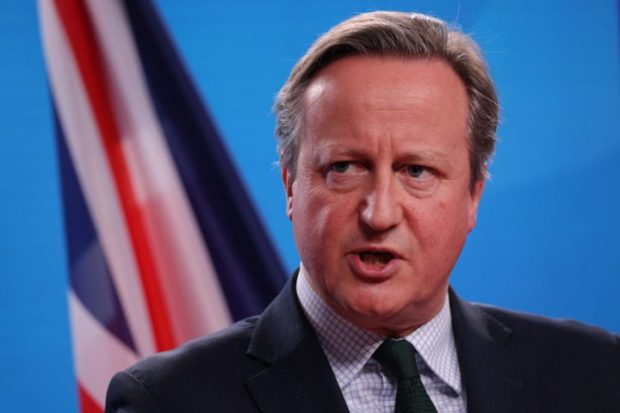If Labour had chosen Liz Kendall instead of Jeremy Corbyn in 2015, she’d be prime minister by now. She was young. She had ideas. Inevitably, she got 4.5 per cent of the vote. It is therefore my solemn duty to inform Lisa Nandy that I consider her the best candidate for Labour leader. On balance, she seems to have the surest chance of saving the party.
Not, of course, that Labour deserves to be saved. But it is in the country’s interest that the party that emerges over the next few years is the least extreme and least anti-Semitic one possible. Like anyone of good sense, I endeavoured to avoid this leadership election entirely, but then I started reading Nandy’s speeches and got hooked.
‘For decades…towns have been trying to tell us there’s a problem,’ Nandy points out. ‘The referendum was their last line of defence for the things that matter.’
Nandy comes to mind when I think about devolution and how the grand schemes of New Labour (the Scottish Parliament) and the Tories (metro-mayors and city/region deals) have either abandoned their original purpose or insufficiently embedded themselves in communities.
On one extreme, the SNP has hijacked devolution and turned it into a one-way ratchet to independence. Nandy correctly identifies their proposed Scexit referendum as ‘an issue that affects the whole of the United Kingdom’.
On the other extreme, city-level devolution has not delivered local control. ‘In towns like Wigan,’ Nandy argues, ‘Manchester can feel as remote and unaccountable as London.’ Towns needs powers, not extra layers of political infrastructure at regional level.
Nandy was the first person I thought of when I trudged through Lord Ashcroft’s grim report into Labour’s electoral failings. Six in ten Labour-to-Tory switchers say Labour no longer represents people like them; 52 per cent found their 2019 vote easier to cast than usual. A majority of Labour defectors (to all other parties) say ‘Labour will need to change very significantly before I’ll consider voting for them again’.
Where do you even begin? A place like Ashfield, the Nottinghamshire seat that voted Tory for the first time in 42 years in December, is a good place to start, and it’s where Nandy went afterwards to ask locals why. You begin by recognising that northern voters, older voters, Labour voters no longer see the party as the vehicle for their aspirations. You begin by appreciating an under-appreciated truth: Labour wins when it bridges tradition and progress, cherishing custom like a conservative while charging injustices with the impatience of a radical.
Conserving what’s good while changing what’s not, bringing together traditionalists and metropolitans, is hard enough without the ‘OK, boomer’ sneer that has seeped into the left’s voice (the sound of which the left has become far too fond). If you go around calling people gammons and racists, you will struggle to understand them and you will be at a loss as how to get them to vote for you. Ironically for a period in which the Labour party was taken over by people who are literally communists, the past four-and-a-half years have been decidedly light on materialism. A politics defined by attitude, guided by fashion and directed to the metaphysical has elbowed out considerations of class, income and opportunity. Iconography has trumped ideology.
There is a grain to Nandy, something that scuffs up against all this smooth triviality. I don’t know if she could win an election but I think she could convince people that Labour doesn’t hate them, not least because her Labour party would be one that no longer did hate them. One group that needs to hear this above all others is British Jews. What has happened is what was warned would happen. What has happened is unforgivable.
Yet, as Lord Ashcroft’s polling shows, 73 per cent of Labour members believe anti-Semitism was ‘invented or wildly exaggerated by the right-wing media and opponents of Jeremy Corbyn’. Labour is a racist party. That racism is wide but it might not yet be deep. Nandy calls anti-Semitism ‘a crisis in the soul of our party’ and pledges to make the disciplinary system independent of the leadership, lower the threshold for suspension and appoint a task force to implement whatever conclusions the EHRC comes to.
There is something else I would like to hear from her: an apology. Not on behalf of her party but on behalf of herself, for doing what her rivals in this contest and every other sitting Labour MP did when fearful British Jews pleaded for solidarity: turned away and put the political interests of the party first. We’ve heard contrition from Labour but what we need to hear is recognition of what they did and what they failed to do.
This electoral slate is among the weakest Labour has fielded. Nandy is the strongest candidate but that’s hardly difficult when the alternatives are Corbyn 2.0, AristoCorbyn and I Can’t Believe It’s Not Ed Miliband. Labour has just been rejected by the electorate for the fourth time in a row and the last time it won a general election the iPhone hadn’t been invented.
The party needs a leader who can address the problems of the future. Just over half of 35-to-44-year-olds are homeowners; a generation ago it was seven in ten. British millennials are the first generation in modern times not to be better off than the preceding generation and four in ten of us has no pension. The number of people living alone has increased by one-fifth in the last 20 years, with all the implications that has for mental health, loneliness, and social care. A strain of leftish thought sees a political opportunity in all this precariousness. But while they may be right, they fall into the same old trap of waiting for the electorate to see sense and vote Labour. The party needs a leader who can give people a reason to vote for it other than despair.
We can’t avoid the sex issue. Labour has never elected a woman leader, unlike almost every other UK party. When the DUP smashes through the glass ceiling ahead of you, you might want to sit out debates about how feminist your opponents are. I agree with those who say the Labour leader should be chosen on merit. I just question a merit-based system that returns 18 male victors in a row.
I don’t know if I can ever vote Labour again after what it did to British Jews but Britain needs a strong opposition in touch with that part of the country north of Regent’s Canal. Lisa Nandy holds out hope for Labour if Labour is ready for it.
Got something to add? Join the discussion and comment below.
Get 10 issues for just $10
Subscribe to The Spectator Australia today for the next 10 magazine issues, plus full online access, for just $10.




















Comments
Don't miss out
Join the conversation with other Spectator Australia readers. Subscribe to leave a comment.
SUBSCRIBEAlready a subscriber? Log in